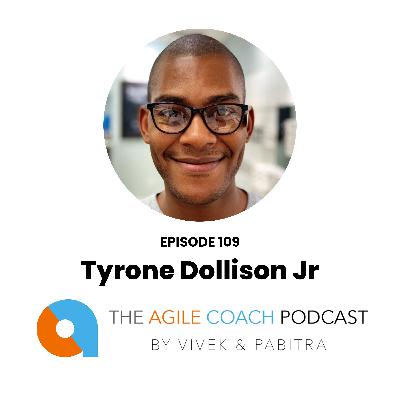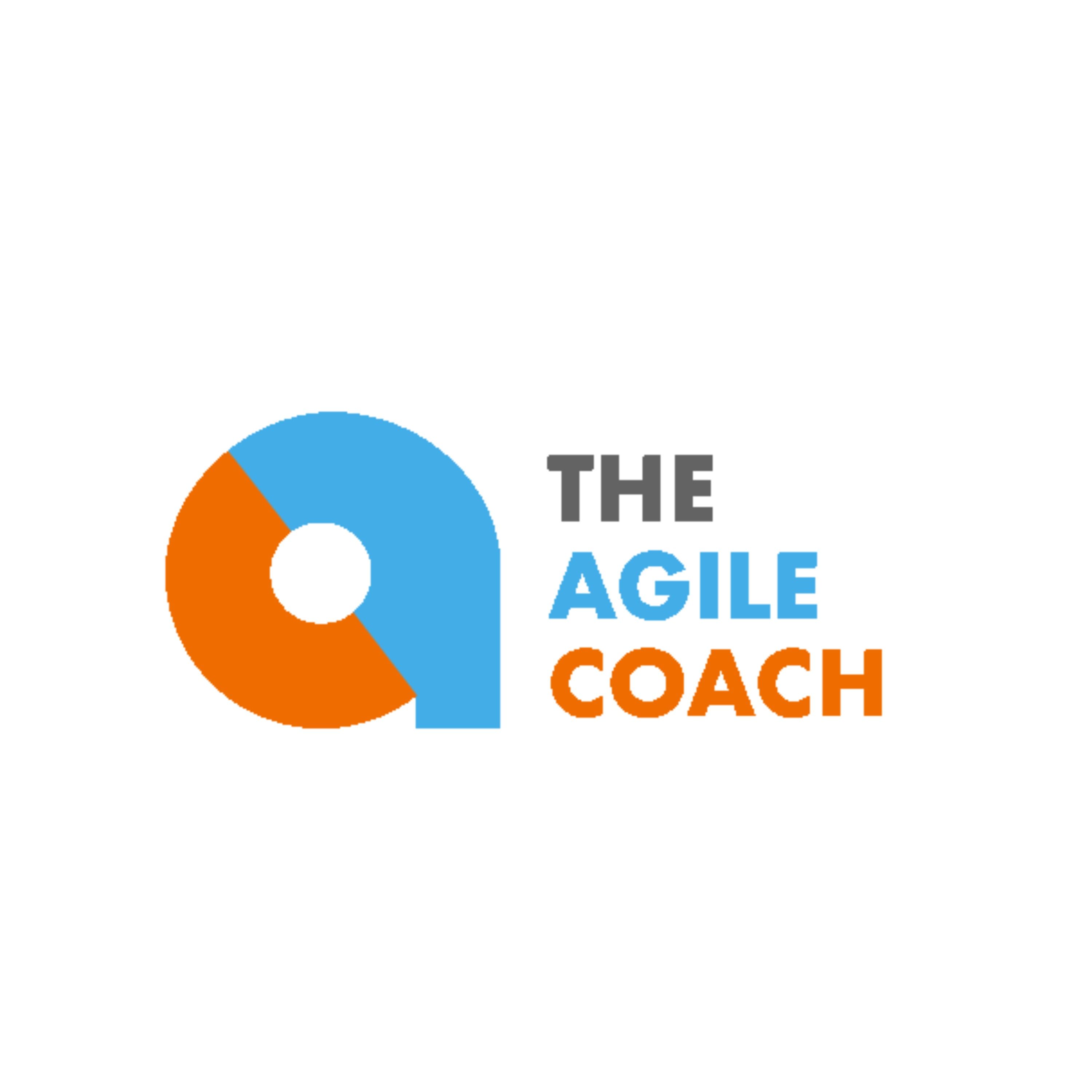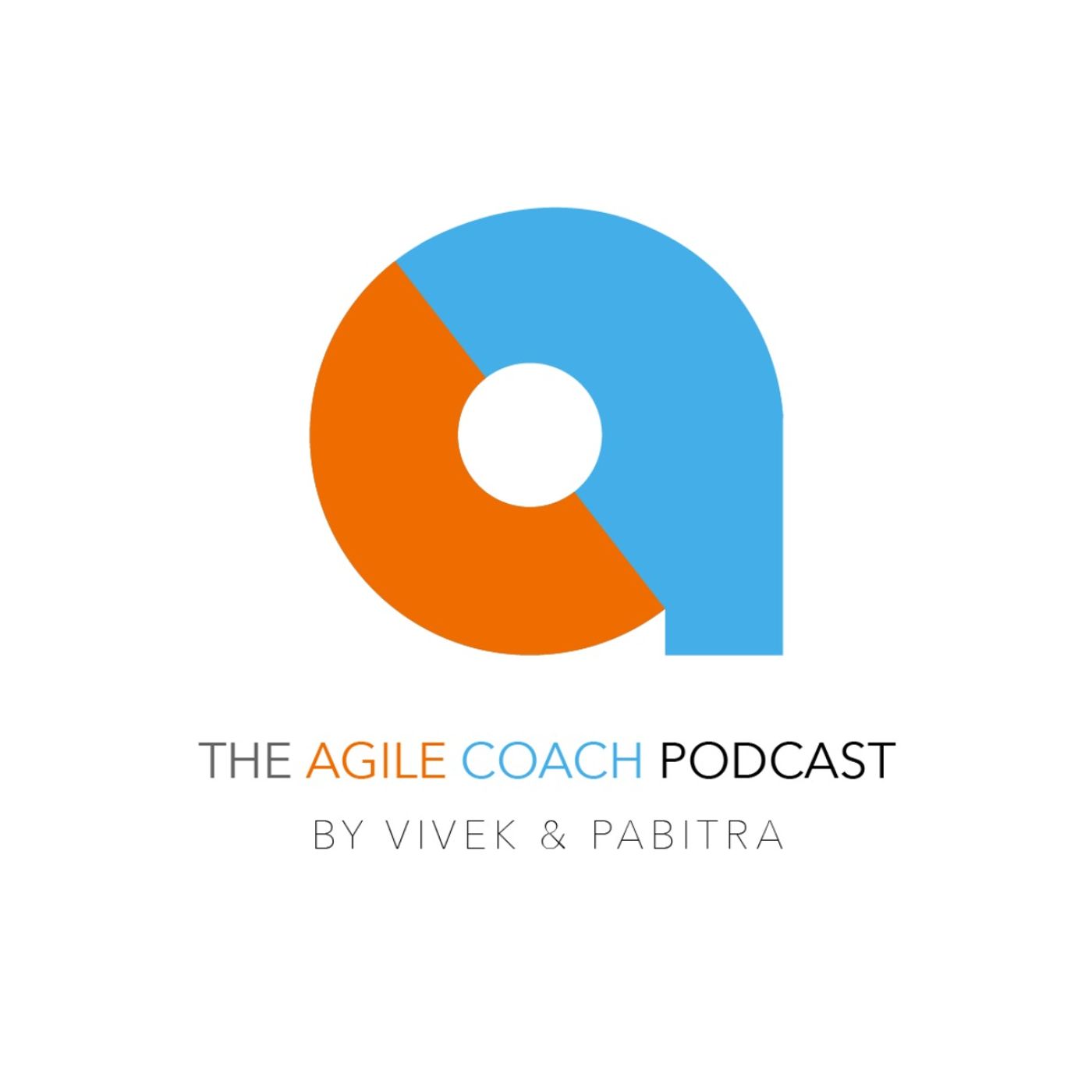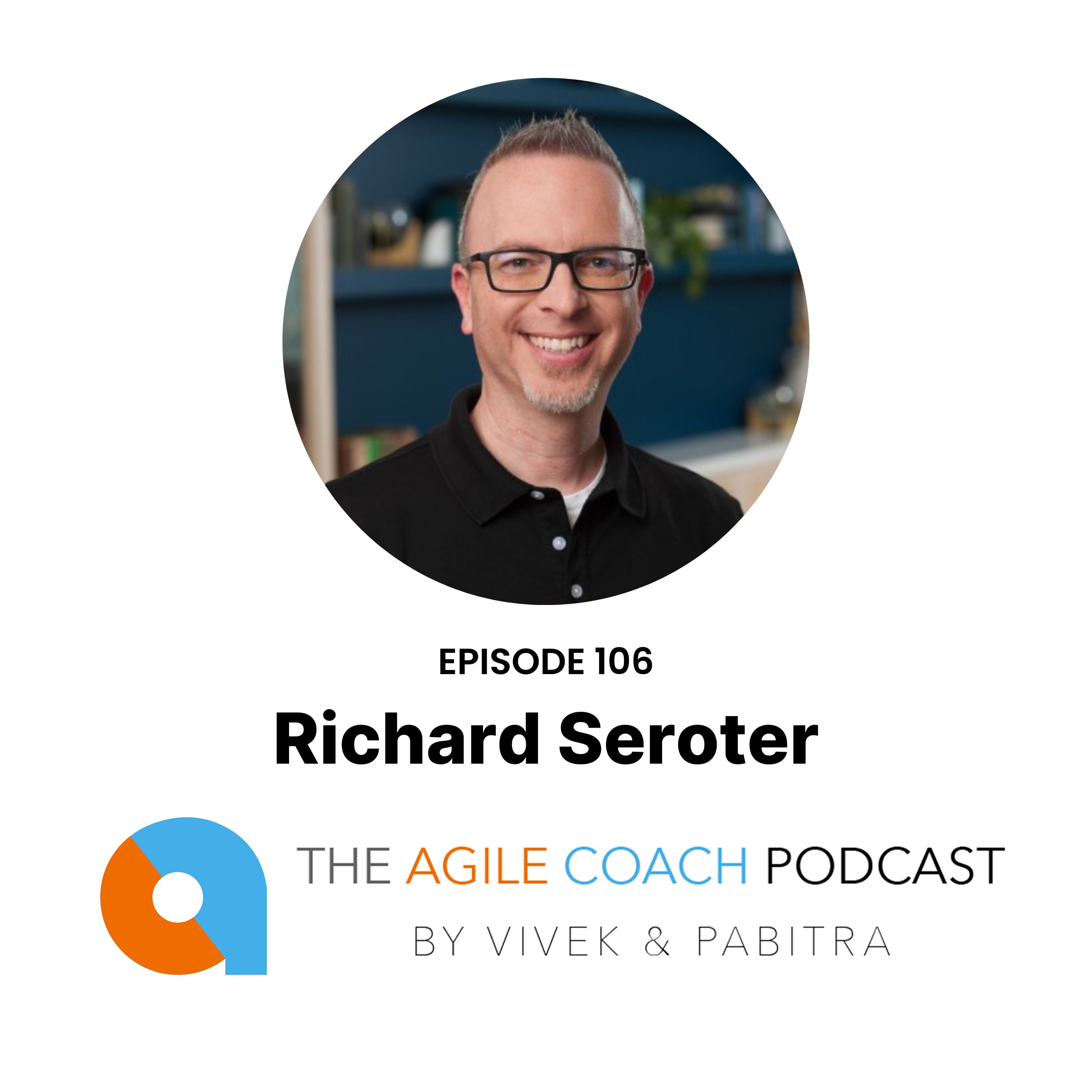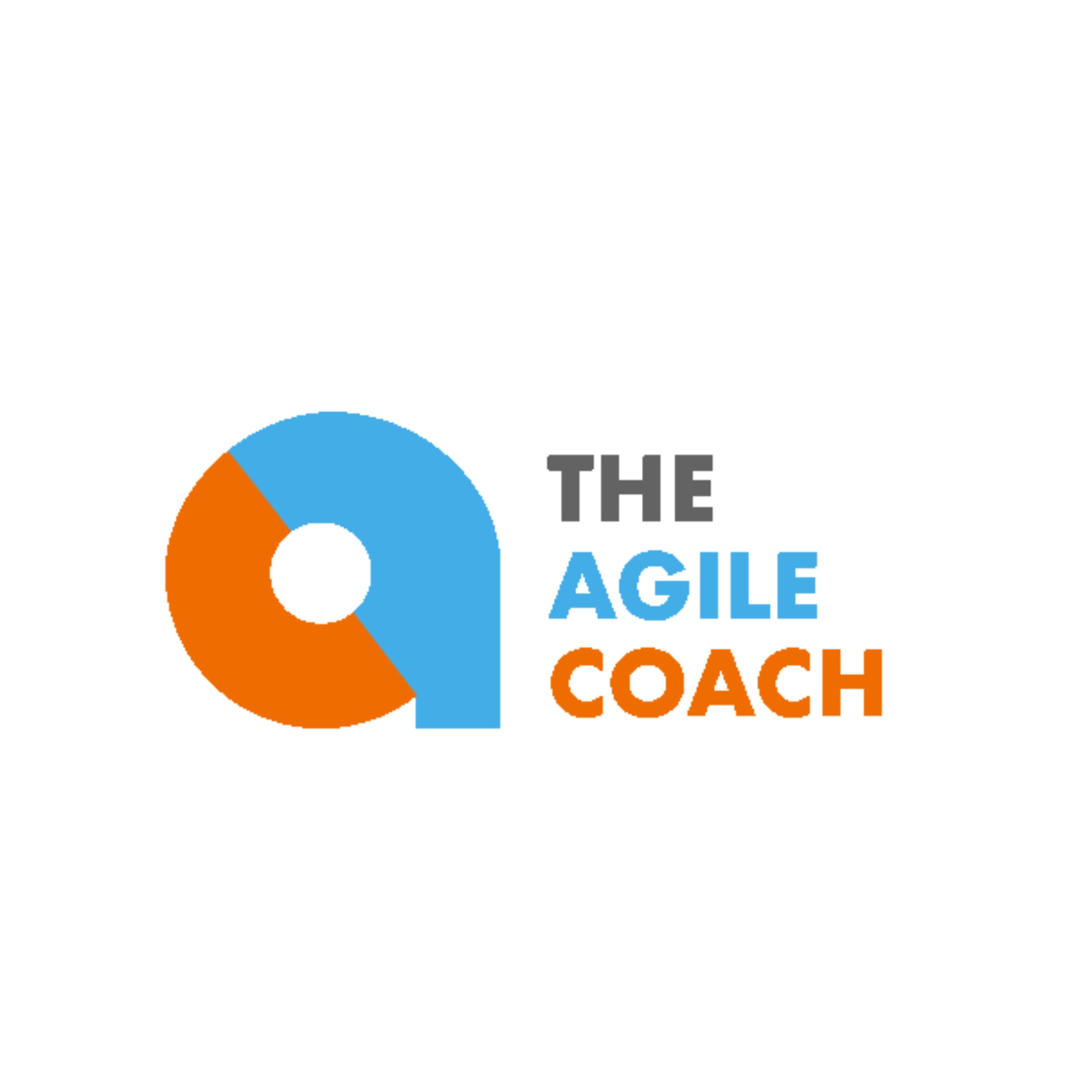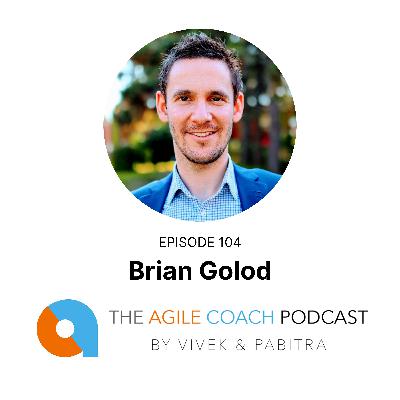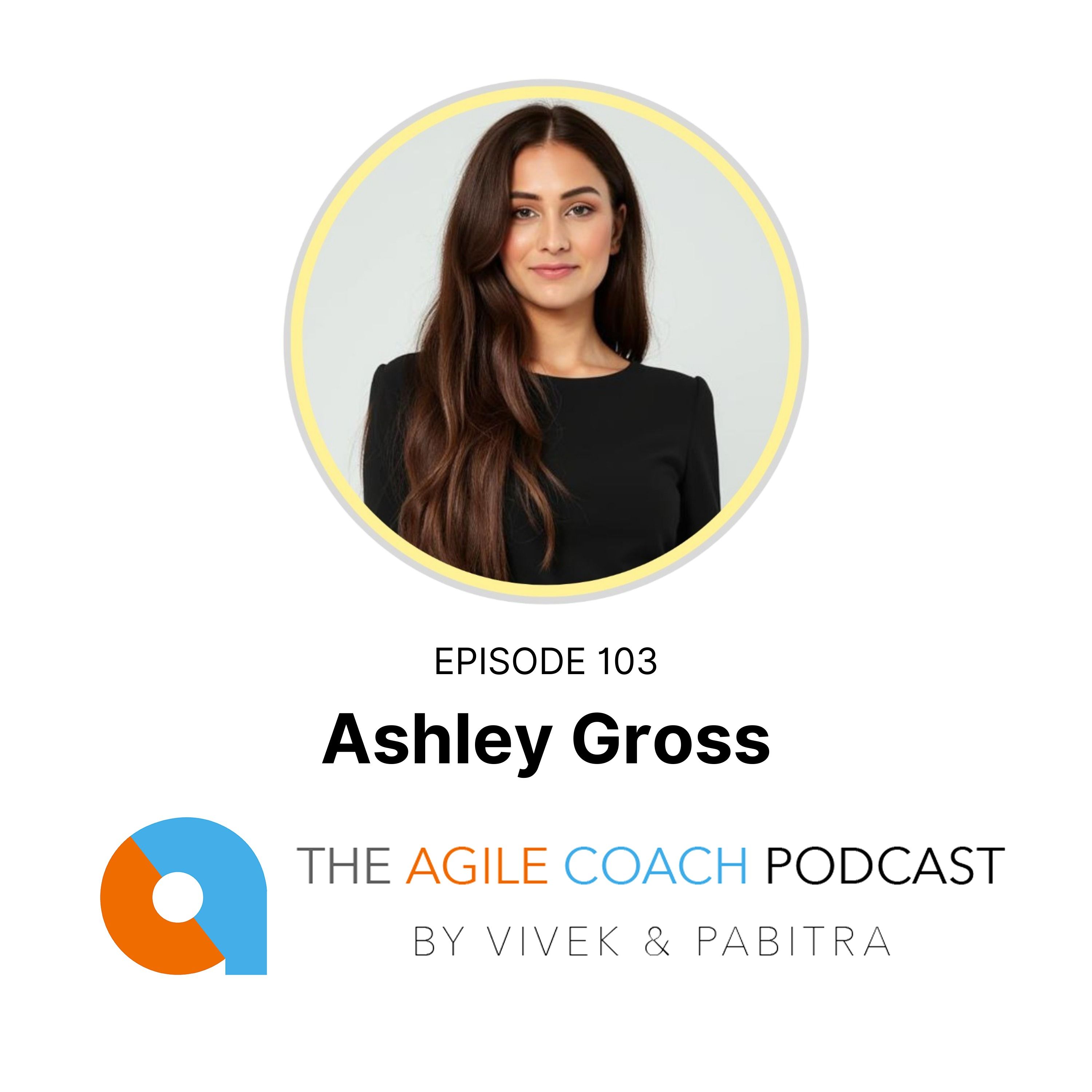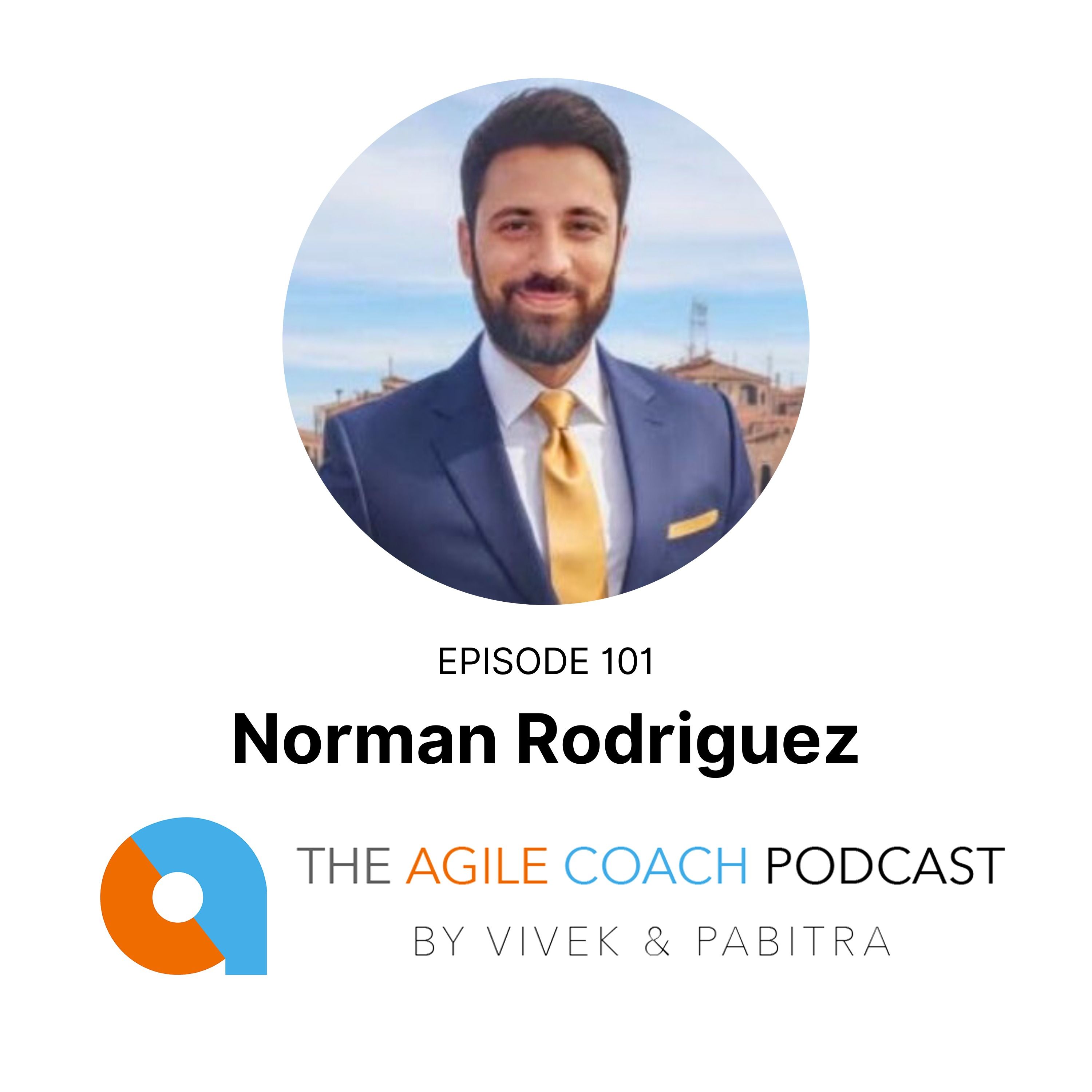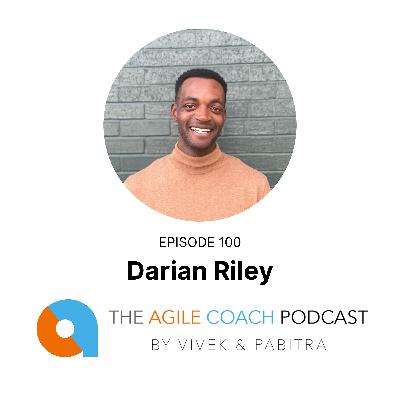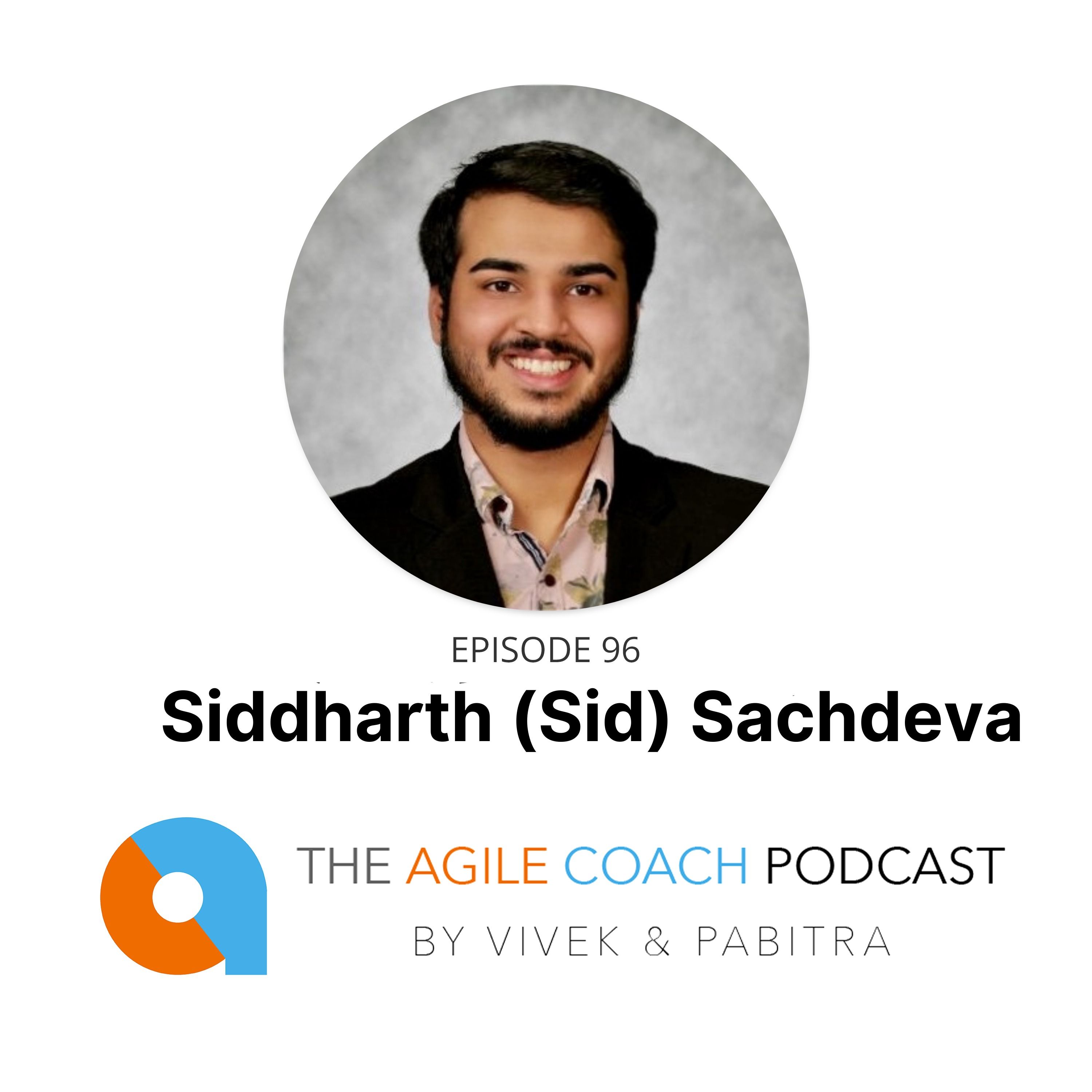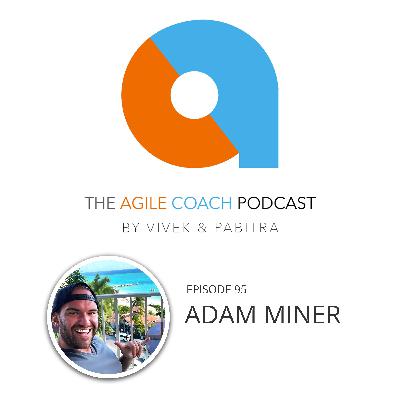Discover The Agile Coach Podcast
The Agile Coach Podcast

The Agile Coach Podcast
Author: Vivek Khattri
Subscribed: 63Played: 527Subscribe
Share
© Vivek Khattri
Description
We bring amazing agile minded individuals from product, coaching, entrepreneurship, and engineering space and bring you an immersive learning experience through stories and practices.
If you are an aspiring or new Scrum Master, Business Analyst, Product Owner, or Product Manager; you will take away a lot from these conversations!
If you are an aspiring or new Scrum Master, Business Analyst, Product Owner, or Product Manager; you will take away a lot from these conversations!
109 Episodes
Reverse
Join us for a heartfelt conversation on The Agile Coach Podcast, where Pabitra sits down with Tyrone Dollison Jr, a true example of resilience and transformation. Tyrone’s story is anything but linear. He’s worn many hats, from working in education and finance to diving deep into analytics, and eventually making his mark as a product leader in tech. Along the way, he’s faced self-doubt, career pivots, and the challenge of breaking into a new industry without a traditional background.In this episode, Tyrone opens up about the real struggles and wins that shaped his journey. He shares how reframing his identity, from “finance guy” to “tech professional” was a game-changer, and why knowing your own story inside out is the secret sauce for nailing interviews. What You’ll Learn:The mindset shift that helped Tyrone see himself as a tech professional—and why that matters more than your resumeHow to prepare for interviews so you can confidently talk about your experience (and not sound like a robot)Building real connections with recruiters and why those relationships can open unexpected doorsThe art of storytelling in interviews, using the STAR method, and how to share both real and hypothetical stories to show your thinkingWhat to do when you don’t know the answer to a question (hint: honesty and curiosity go a long way)Why helping others in your network can come back to help you in surprising waysHow to treat interviews as a two-way street, gathering data about companies and making sure they’re the right fit for you If you enjoy this episode, we’d love for you to rate, review, and share it with your friends!
In this special episode of The Agile Coach Podcast, we bring together four inspiring guests: Sid Sachdeva, Paulo Carini, Haley Prestwood, and Darian Riley, each sharing their unique path into the tech industry. From international students navigating visa challenges to career changers leveraging non-technical backgrounds, this episode is packed with practical advice, candid reflections, and actionable strategies for anyone aspiring to break into tech roles like Product Manager, Scrum Master, or Agile Coach. Key Topics & Insights1. Overcoming Barriers as International StudentsSid Sachdeva and Paulo Carini recount their experiences moving to the U.S. for education, facing uncertainties, and navigating the additional hurdles of visa sponsorship and limited interview opportunities.They emphasize the importance of persistence, networking, and standing out by being resourceful and indispensable to their teams.2. Leveraging Non-Traditional BackgroundsHaley Prestwood and Darian Riley highlight how skills from unrelated fields, such as philosophy, politics, law, and even Division I basketball coaching, can translate into tech roles.Both stress the value of soft skills: communication, facilitation, and leadership, which are often more critical than technical expertise for roles like Scrum Master and Product Manager. 3. The Power of Mentorship and CommunityAll guests credit mentorship, peer support, and structured bootcamps (like the Agile Coach Program) as pivotal in their transitions.Mock interviews, feedback from experienced practitioners, and ongoing community support helped them build confidence and refine their approach to job applications and interviews.4. Mindset Shifts and Dealing with Imposter SyndromeHaley and Sid discuss the emotional journey, moving from self-doubt and imposter syndrome to confidence and self-advocacy.They encourage listeners to "lean into discomfort," ask questions, and recognize that growth happens outside the comfort zone.5. Practical Job Search StrategiesThe guests share actionable tactics: rigorous interview prep, building detailed Q&A documents, practicing with mentors, and making themselves available for opportunities at any time.Paulo and Sid note the importance of being proactive, applying to many positions, and not being discouraged by rejections, especially as international candidates.6. Transitioning and Thriving in Tech RolesOnce in their roles, guests focused on continuous learning, building relationships with team members, and seeking feedback.Darian Riley, now a senior agile leader, describes how coaching and servant leadership skills from sports directly informed his agile practice, team empowerment, and ability to drive business value.7. Embracing Remote Work and FlexibilityHaley and Paulo reflect on the benefits and adjustments of remote work, including the freedom to travel and the need for self-discipline and asynchronous communication.8. The Role of AI and Continuous UpskillingThe panel discusses how AI tools are transforming learning and productivity, making it easier to upskill and adapt to new challenges in tech. KEY TAKEAWAYS:Persistence Pays Off: Breaking into tech, especially as an international student or career changer, requires resilience, relentless application, and a willingness to stand out.Soft Skills Matter: Communication, leadership, and adaptability often outweigh technical skills, especially in agile roles.Mentorship Accelerates Growth: Seek out mentors, practice interviews, and leverage community resources.Mindset is Everything: Overcoming self-doubt and embracing discomfort are crucial for growth.Be Proactive and Prepared: Prepare extensively for interviews, make yourself available, and treat every opportunity as potentially life-changing.Continuous Learning: Invest in your own growth, leverage AI tools, and never stop improving.
In this special episode of The Agile Coach Podcast, leading voices in product ownership and agile transformation: Joe Justice, Richard Seroter, Mark Shead, Sheetal Rajpal, and Jeff Bubolz, share their hard-won lessons from building and scaling products at organizations like Tesla, Google, Amazon, LendingTree, and more. Their experiences span hardware and software, startups and global enterprises, and regulated industries, offering a comprehensive look at what it truly means to be an effective product owner today.Key Product Ownership Insights:Joe Justice (Agile Business Institute, ex-Tesla, WikiSpeed)Agility as Innovation Engine: Agility is about making change cheaper, faster, and less emotionally taxing. At Tesla, the “Justice Board” (a cascading chain of KPIs) aligns everyone to the mission, empowering any contributor to propose measurable experiments that advance the master plan12.Embedded Leadership: Leaders, including product owners, should be deeply involved with teams—removing barriers, modeling commitment, and sharing ownership of outcomes.Mob Programming for Ownership: High-performing teams share business context and technical knowledge through practices like mob programming, making the product owner an integral, accessible part of the team rather than a distant decision-maker.Richard Seroter (Google Cloud)The PO as Value Translator: The product owner is not a distant spec-writer but an “intense stakeholder”—embedded with engineers, translating customer needs into actionable stories, and prioritizing with courage and clarity.Continuous Feedback & Data-Driven Decisions: Modern product teams thrive on small batch delivery and rapid feedback. Product owners must be adept at interpreting telemetry and customer data to inform priorities and validate outcomes quickly.Role Fluidity: In some organizations, the distinction between product owner and product manager blurs, but the core remains: maximizing value by being close to both customers and the delivery team, reducing friction between vision and execution.Mark Shead (Xeric Corporation)Principles Over Labels: True agility is about living agile values and principles, not just adopting practices or titles. Teams and product owners must align decisions to core agile principles, not just mimic successful teams elsewhere.Embedded Product Owners: The most effective product owners are those who use the product themselves and are continuously available to the team—answering questions, clarifying needs, and making real-time decisions.Backlog as a Living Tool: Product owners must ruthlessly prioritize, avoid bloated backlogs, and focus on delivering customer value, not just accumulating requests or technical debt.Sheetal Rajpal (Head of Product; ex-Amazon, LendingTree)Customer-Centricity & Data: Product owners must “walk in the customer’s shoes,” using data and direct observation to continuously improve user experience and product outcomes.Strategic Product Thinking: At Amazon, product leaders own both strategy and execution—articulating a clear vision, defining decision-making tenets, and using the “working backwards” process to align teams around customer-centric outcomes.Building Data-Driven Products: Making products data-driven requires clarity on objectives, a deep understanding of data quality, and explicit constraints—especially when leveraging AI or machine learning.Jeff Bubolz (Organizational Agility Advisor, Co-Founder)Focus & Trade-Offs: The essence of product ownership is making tough trade-offs and saying “no” as often as “yes.” A focused, strategic backlog is more valuable than a frantic, overloaded one16.Scaling Without Overhead: When scaling, avoid creating layers of product owners and managers that add friction. Instead, form autonomous, cross-functional teams aligned to real products and outcomes.The Three Vs: Product owners should set Vision, maximize Value, and Validate outcomes—prioritizing learning and continuous improvement over rigid plans.Practical Advice for Product OwnersBe Embedded: The best product owners are part of the team’s daily life, not just attending ceremonies or writing requirements. They are accessible, knowledgeable, and invested in both the product and the people.Prioritize Ruthlessly: Every “yes” to a backlog item is a “no” to something else. Product owners must be strategic, focusing on what delivers the most value and aligns with the product vision.Align on Principles: Start with shared understanding of agile principles and values, then select practices that support those principles in your context.Use Data Effectively: Leverage real-time data and customer feedback to inform decisions, validate outcomes, and iterate quickly.Enable Team Autonomy: Empower teams to solve problems, avoid micromanagement, and foster a culture of continuous learning and experimentation.Strategic Scaling: When scaling, ensure teams remain cross-functional and outcome-oriented, not siloed by function or weighed down by management layers.Quotes from the Episode“Agility is making change cheaper in time and money, and also in emotional willpower—making it less draining or even more fun. That is the game.” — Joe Justice“A product owner is not an arm’s length participant. You should be pairing with engineers, getting rapid feedback, and translating customer needs into value.” — Richard Seroter“The most effective product owners I’ve ever worked with were embedded with the team, using the software daily, and always available to help.”— Mark Shead“At Amazon, PMs own both strategy and execution—articulating vision, setting decision-making tenets, and working backwards from the customer.” — Sheetal Rajpal“The essence of product ownership is making tough trade-offs and saying no as often as yes. Focused, strategic backlogs unlock value.” — Jeff Bubolz
In this episode of The Agile Coach Podcast, host Vivek Khattri is joined by Richard Seroter, Chief Evangelist at Google Cloud and a returning guest, for a candid conversation about the future of product management and AI. Richard shares his journey from leading outbound product management teams to driving developer relations at Google, offering an insider’s perspective on Google Cloud’s AI strategy and what it means for product leaders, teams, and organizations.Richard unpacks how Google’s unique AI stack-from foundational research and custom TPUs to platforms like Vertex and Gemini-powered assistants-is shaping the next generation of products. The discussion dives deep into how AI is transforming the role of product managers and product owners, and why adaptability, curiosity, and discipline are more critical than ever.Key TakeawaysGoogle’s AI Stack: More Than HypeGoogle’s end-to-end AI stack spans research, custom hardware (TPUs), foundational models (like Gemini), platforms (Vertex), and user-facing tools that power everything from Gmail to code assistants.The focus: Make AI widely useful and integrated-not just a novelty.Product Management in the Age of AIAI accelerates landscape analysis, market research, and prototyping-what once took weeks can now happen in minutes.Product managers must ruthlessly prioritize, know when to quit, and focus on high-impact opportunities-even at large companies like Google.Timeless Skills for Modern PMsHumility, curiosity, and discipline remain essential. The best PMs lead through influence, not authority, and are relentless about customer empathy.“Customer zero” mindset: Use your own product to build insight and credibility.AI Fluency for TeamsBecoming “AI first” starts with being “AI ready.” Upskill every team member, from executive assistants to general managers, in foundational AI concepts and tools.Build comfort and reduce anxiety by encouraging experimentation and bottom-up idea generation.Prototyping and CommunicationThe days of 50-page specs are fading. Use AI tools to create prototypes, videos, and visual artifacts-even if you don’t code-to communicate ideas and inspire teams.Product owners and managers must own the translation from concept to working representation.Building Trust and Responsible AIAvoid the “black box” trap: Understand how LLMs fit into architectures, and design for transparency, real-time updates, and responsible evaluation.Regularly test and update systems as models evolve to maintain quality and trust.Agents and Agent PlatformsAgents are redefining automation and business processes. Google’s Agent Space and development kits enable low-code/no-code agent creation and orchestration.Product leaders should familiarize themselves with agent frameworks to unlock new possibilities for users and businesses.Lead the ChangeAI isn’t just about productivity-it’s about doing better, more fulfilling work at higher quality and impact.Don’t wait for AI to reshape your role. Proactively lead your career and organization through this transformation.Connect with Richard Seroter:LinkedIn: https://www.linkedin.com/in/seroter/Timestamps:00:00 – Introduction: Richard’s journey and evolving role at Google Cloud02:00 – Google’s AI stack: From research to real-world applications05:00 – Product strategy: Where PMs add value in an AI-driven world10:00 – Prioritization, opportunity cost, and ruthless focus at scale12:00 – Timeless PM skills: Humility, curiosity, and discipline16:00 – AI fluency: Upskilling teams and building readiness20:00 – Prototyping and communication: New tools for product owners24:00 – AI’s impact on engineering productivity and team workflows28:00 – Actionable steps for AI-ready teams: Artifacts, documentation, and collaboration32:00 – Tools, research, and continuous customer feedback at Google35:00 – Misconceptions and best practices in building AI products40:00 – Scoping MVPs and defining requirements for AI-powered features42:00 – Agents and agent platforms: The next frontier in automation46:00 – The future of work: Leading with AI, not just adapting to it48:00 – Closing thoughts: Be the driver of change, not the passenger
In this episode of The Agile Coach Podcast, we bring together a powerhouse panel of product management leaders: Diego Granados, Richard Seroter, Rajsi Rana, Neha Satya, and Parth Detroja. Each guest shares their unique journey into product management, offering firsthand perspectives from top companies like Microsoft, Oracle, Google, and beyond.Our conversation explores how backgrounds in healthcare, finance, and data analytics can lead to thriving PM careers, emphasizing that a technical degree is not a prerequisite for success. The guests break down the core skills needed-critical thinking, emotional intelligence, cross-functional collaboration-and provide actionable advice for anyone aspiring to break into or advance within product management.We also discuss the differences between PM roles at startups versus large enterprises, the evolving relationship between product managers and product owners, and how to lead through influence rather than authority. The episode is packed with practical strategies for interviews, panel preparation, and building daily habits that set PMs apart in a competitive field. Featured Guests:Diego GranadosRichard SeroterRajsi RanaNeha Satya Parth Detroja Key Takeaways:Diverse Backgrounds: Success in product management is possible from non-traditional backgrounds-technical degrees are helpful but not required.Foundational Skills: Critical thinking, emotional intelligence, and cross-functional teamwork are essential.Dealing with Ambiguity: PMs must drive clarity and connect customer needs, business objectives, and technical feasibility.Influence Over Authority: Product managers lead through storytelling, data, and consensus-not direct authority.Customer Focus: The best PMs relentlessly advocate for the customer at every product stage.Role Clarity: The distinction between product manager and product owner varies by company, but both require close collaboration with engineering and stakeholders.Interviewing & Preparation: Build rapport with recruiters, use relevant buzzwords, tailor your story, and research your interview panel.Continuous Improvement: Treat product management and interviewing as skills to be honed daily-write, practice, and seek feedback. Timestamps00:00 – Introduction: Meet the guests and their journeys 02:00 – Do you need a technical background? Myths debunked 05:00 – What does a product manager really do? 08:00 – Core skills: Ambiguity, cross-functional work, and influence 12:00 – Defining your PM role and career growth 15:00 – Product owner vs. product manager: Real-world perspectives 20:00 – Leading through influence, not authority 24:00 – Building strong partnerships with engineering 26:00 – Interview tips: Recruiter calls and panel strategies 30:00 – Daily habits for PM success and continuous learning 32:00 – Final thoughts: Growth mindset and resilience in the PM journey
In this episode of The Agile Coach Podcast, hosts Vivek and Pabitra sit down with Brian Golod, an award-winning resume writer, LinkedIn influencer, and career strategist who has helped thousands of professionals land interviews and job offers. With over 200,000 followers on LinkedIn and a resume template downloaded over 100,000 times, Brian shares his unique journey from software developer and product owner to becoming a sought-after mentor for senior tech professionals and executives.Brian unpacks the real reasons job seekers struggle to land interviews, why a resume alone isn’t enough, and how data-driven strategies, networking, and personal branding can transform your job search. He dives deep into resume writing, LinkedIn optimization, and interview techniques, offering actionable advice for anyone looking to stand out and secure multiple job offers. KEY TAKEAWAYS:Beyond the Resume: Landing interviews requires more than just a well-written resume. Social profiles, networking, and a proactive application strategy are equally important.Data-Driven Approach: Build your resume based on current market needs by analyzing multiple job postings for your target role and identifying common keywords and requirements.One Story, One Resume: Use a single, well-optimized resume and LinkedIn profile for your target role to avoid red flags and confusion.Apply Fast, Apply Smart: Speed matters—apply quickly to new postings and avoid the “easy apply” trap by reaching out directly to hiring managers and recruiters.Target the Sweet Spot: Apply for roles where you meet 60–80% of the qualifications to ensure growth and avoid stagnation.Interview Mindset: If you’re brought in for an interview, the employer already sees value in you. Focus on building rapport, demonstrating curiosity, and thinking out loud when faced with unknowns.Networking That Works: Stand out by engaging meaningfully with content creators and professionals on LinkedIn—give value before asking for help.Compensation Strategy: Never disclose your salary expectations early. Let employers make the first offer to maximize your negotiating position.Plain Text Wins: Use a simple, plain-text resume format with bullet points—avoid fancy templates that can’t be read by applicant tracking systems (ATS).Leave a Lasting Impression: Success in interviews and networking is about the experience you create for others—be memorable, authentic, and valuable.Connect with Brian Golod:LinkedIn: https://www.linkedin.com/in/briangolod/
In this episode of The Agile Coach Podcast, we sit down with Ashley Gross, CEO of AI Workforce Alliance and recognized by Forbes as the highest-paid AI consultant in the market. Ashley shares her remarkable journey from a decade-long career in marketing to becoming a leading AI educator and consultant, specializing in the implementation of AI agents and generative AI in business.Ashley discusses how her need to balance motherhood with a demanding career led her to explore AI tools, ultimately transforming her workflow and delivering outsized results for her organization. She breaks down the fundamentals of AI and AI agents in plain language, explains the difference between automation and agentic workflows, and highlights how businesses, especially project managers, business analysts, and enterprise leaders can leverage AI agents to drive efficiency, boost collaboration, and solve real business problems.We explore the cultural and operational challenges of AI adoption in enterprise settings, including data privacy, change management, and the importance of cross-functional enablement. Ashley also provides a behind-the-scenes look at her consulting process, from identifying bottlenecks in customer journeys to building and scaling agentic workflows that deliver measurable ROI. She shares practical advice for aspiring professionals looking to future-proof their careers in the age of AI, emphasizing experimentation, continuous learning, and the value of people skills.Key Takeaways:Ashley’s Journey: How a marketer condensed her workweek using AI, leading to a $25M pipeline overachievement in just three months1.AI vs. Automation: Understanding the distinction between rule-based automations and autonomous AI agents, and why it matters for business processes1.Real-World Impact: How AI agents can autonomously manage project workflows, from transcribing calls to creating actionable tasks in tools like Asana1.Enterprise Adoption: Insights into how even risk-averse industries like healthcare and government are embracing AI, and the cultural shifts required for successful implementation1.Data Security & Regulation: Best practices for vetting AI vendors, ensuring compliance, and using AI to audit privacy policies1.Implementation Blueprint: Ashley’s approach to identifying business problems, piloting agentic workflows, and scaling solutions across organizations with robust documentation and enablement plans1.Measuring ROI: A framework for tracking both quantitative and qualitative outcomes during AI pilot projects and organization-wide rollouts1.Future of AI Roles: Predictions about emerging roles like “marketing engineer” and the importance of domain expertise and adaptability in the evolving AI landscape1.Career Advice: Why curiosity, intentional tool optimization, and people skills are critical for anyone looking to build a resilient career in AI-driven business environments1.Connect with Ashley:LinkedIn - https://www.linkedin.com/in/theashleygross/Timestamps:00:00 – Introduction to Ashley Gross & her background02:00 – How Ashley condensed her workweek with AI05:00 – AI vs. automation: What’s the difference?10:00 – AI agents in project management: Real-world examples13:00 – Enterprise adoption: Culture, excitement, and barriers15:00 – Data privacy, regulation, and vendor selection18:00 – Ashley’s consulting process: From problem to agentic workflow21:00 – Case study: Accelerating sales cycles with AI agents24:00 – Scaling agentic workflows: Documentation & enablement27:00 – Measuring ROI: Quantitative and qualitative outcomes29:00 – The future of AI roles and skills30:00 – Career advice for aspiring AI professionals32:00 – Ashley’s educational programs and closing thoughtsIf you enjoyed this episode, please rate, review, and share it with your network!
In this episode, Vivek sat down with Marcelo, a product leader with over 25 years of experience in technology, including key roles at Microsoft and Amazon. Marcelo shares insights on building innovative products, the importance of product vision and strategy, and his PRFAQ framework, a method used at Amazon to align teams, validate ideas, and drive successful product development.They also discuss how new and aspiring product managers can think strategically, set meaningful OKRs, and develop the right mindset for success. Whether you’re a startup founder or part of a large-scale enterprise, this conversation will leave you with actionable takeaways on how to structure your product thinking for impact. Key Takeaways:✅ The PRFAQ Framework: Amazon’s structured approach to idea validation and strategic product development.✅ How writing narratives instead of presentations fosters better decision-making.✅ The difference between product vision and strategy—and why both are essential.✅ The role of customer-centric thinking in creating successful products.✅ How new product managers can quickly ramp up and add value to their teams.✅ Best practices for setting OKRs and tracking meaningful product metrics.✅ Marcelo’s personal journey from engineering to product leadership and the lessons he learned along the way. Connect and learn more about Marcelo Calbucci. LinkedIn: https://www.linkedin.com/in/marcelocalbucci/Resources & Links:📖 Marcelo’s Book on the PRFAQ Framework: https://www.theprfaq.com/📄 Example PRFAQ Templates: https://www.theprfaq.com/examples📧 Marcelo’s Website: https://calbucci.com/
In this episode of The Agile Coach Podcast, we sit down with Norman Rodriguez, a seasoned sales leader who shares his inspiring journey from political campaigns and B2C sales to thriving as an SDR (Sales Development Representative) at Google and eventually founding his own company. Norman breaks down the nuances of the SDR role, offering practical advice for anyone looking to transition into high-paying B2B sales positions.We explore the foundational skills needed to succeed in sales, the differences between B2C and B2B sales, and how resilience, energy, and coachability can set you apart in interviews. He also shares his insights on leveraging tools like LinkedIn Sales Navigator, crafting compelling cold emails, and building long-term relationships with clients.Key Takeaways:What is an SDR? Understanding the role and why it’s crucial for businesses.B2C vs. B2B Sales: Contrasting high-pressure commission-only roles with salaried SDR positions.Norman’s Journey: How he landed an SDR role at Google without a college degree and used grit to succeed.Prospecting Basics: Researching ideal client profiles (ICPs) and buyer personas effectively.Outreach Techniques: Writing cold emails that stand out and optimizing subject lines for mobile readability.Qualifying Leads: Asking the right questions to ensure meetings are valuable for both parties.Mindset for Success: Why energy, resilience, and a learner’s mindset are key for landing your first SDR job.Connect with Norman:LinkedIn: https://www.linkedin.com/in/norman-rodriguez/Timestamps:00:00 - Introduction to Norman & his background02:00 - What is an SDR? Breaking down the role05:00 - Transitioning from B2C to B2B sales10:00 - Norman’s experience as an SDR at Google15:00 - Prospecting basics: Ideal client profiles & buyer personas20:00 - Cold emailing tips: Subject lines & mobile optimization25:00 - Qualifying leads effectively30:00 - Mindset for success: Energy & coachability in interviews40:00 - Tools for SDRs: LinkedIn Sales Navigator, LeadIQ, ZoomInfo50:00 - Final thoughts & Norman’s advice for aspiring SDRsIf you enjoyed this episode, please rate, review, and share it with your network!
In this episode of The Agile Coach Podcast, we sit down with Darian Riley, a former Division I basketball coach turned agile leader, who shares his inspiring journey from the sports world to guiding teams in major organizations. Darian opens up about how his coaching background naturally translated into agile leadership, emphasizing servant leadership, team building, and fostering high-performing, self-organizing teams.They dive deep into topics like transitioning careers, empowering teams to deliver business value without feeling overwhelmed, and navigating the challenges of scaling agile practices across organizations. Darian also shares his insights on leveraging AI in agile workflows and how Scrum Masters can evolve their roles to contribute to product strategy and organizational innovation.Key Takeaways:Darian’s Transition from Coaching Basketball to Agile Leadership: How coaching skills like mentoring and team building naturally transferred to agile practices.Empowering Teams: Strategies for helping teams focus on business value while avoiding overwhelm.Upskilling Through Pair Programming: How senior team members can mentor others effectively.AI in Agile: Practical ways to integrate AI into agile workflows for efficiency and collaboration.Scrum Master Evolution: Moving beyond facilitation to contribute to product strategy and innovation.Creating Wins: Small shifts like transitioning from Scrum to Kanban for better team alignment.Advice for New Agile Leaders: Building relationships through one-on-ones and understanding the technical and human sides of teamwork. Connect with Darian:LinkedIn: https://www.linkedin.com/in/darian-riley-b1915349/ Timestamps:00:00 - Introduction to Darian & his background02:00 - Transitioning from coaching basketball to agile leadership05:00 - Empowering teams to focus on business value without overwhelm10:00 - Pair programming and strategies for upskilling teams15:00 - Coaching teams on ownership and continuous improvement20:00 - Leveraging AI in agile workflows for efficiency25:00 - Aligning with leadership goals as a Scrum Master30:00 - Evolving the Scrum Master role to influence product strategy40:00 - Creating wins through small shifts in team practices50:00 - Final thoughts & Darian’s reflections on his career journey If you enjoyed this episode, please rate, review, and share it with your network!
Sid’s transition from aerospace engineering to product management and the pivotal moments that shaped his career.The challenges international students face in the job market and Sid’s strategies for overcoming them.The importance of networking, soft skills, and executive presence in breaking into product roles.How Sid learned to work with software engineers, stakeholders, and executives without a technical coding background.Key takeaways on job hunting, interview prep, and making an impact in the corporate world. Key Quotes from Sid Sachdeva:“Being proactive is key. You have to start six months before everyone else to get ahead.”“It’s not about how much you know—it’s about how you show up, engage, and collaborate.”“Networking is a numbers game—keep applying, keep connecting, and don’t take rejections personally.”“Product management is like being a mini-CEO—you have to balance engineering, design, and business.”
In this episode, we talk about the steps to getting hired as a Scrum Master or Agile Coach. Adam shares his personal story and gives easy-to-follow advice on how to do well in job interviews.Main Topics Covered:1. How to Get Started in Agile Roles: Adam shares how he went from working in finance to becoming a Scrum Master and later an Agile Coach. He explains how he discovered Agile and why it made sense to him.2. Tips for Scrum Master Interviews: Adam talks about the different stages of job interviews:First Interview: How to tell your story and connect with the recruiter.Second Interview: How to prepare for more detailed conversations.Third Interview: How to understand the team and company culture.3. Personal Growth as a Way to Stand Out: Adam explains how working on personal growth, like reading self-improvement books, can help you stand out in interviews. He encourages people to talk about their personal growth in job interviews to show they are always learning.4. Coaching During Interviews: Adam shares how you can add value during interviews by coaching the interviewer. He gives examples of how he explained Agile ideas to interviewers who didn’t fully understand them.5. Do You Need a College Degree to Be a Scrum Master? Adam answers the common question about whether a college degree is needed to work in Agile. His answer? No, you don’t need a degree. What matters more is your mindset and willingness to learn.Practical Interview Tips:Share Your Agile Story: Talk about how you got into Agile and what you’ve learned.Be Yourself: Show that you’re open to learning and can fit into the company’s culture.Focus on Personal Growth: Mention books or courses that helped you grow as a person.Ask Good Questions: Use the interview to learn more about the company and role.Book Recommendations:How to Win Friends and Influence People by Dale CarnegieThe 7 Habits of Highly Effective People by Stephen CoveyLeadership Gold by John MaxwellKey Quotes from the Episode:“If you talk about personal growth in your interviews, you will stand out from other candidates.” – Adam Miner“You don’t need a degree to succeed in Agile. It’s more about your mindset and learning.” – Adam Miner
Landing your dream job straight out of school sounds great, but there's a big hurdle to cross first: the interview. It's not just a quiz about what you know; it's more about how you're ready to grow and handle challenges. Confidence plays a big role here, but let's face it, interviews can be nerve-wracking. The key is to build up your interview confidence like you would a muscle, with the right approach and mindset. In this episode, we get into the nitty-gritty of job interviews with Neha, who's been through the wringer and come out on top. She's now a product manager and has some great insights on how to handle interviews, from the first handshake to the final questions. Neha's journey is pretty inspiring—starting off in business analytics, moving into the health tech industry, and now making waves at a company called Tree, where she's shaking up the influencer marketing world.
In this episode of The Agile Coach, host Vivek is joined back again with Adam Miner, an experienced Agile Coach with a background as a Scrum Master, to share his journey of breaking into his first Scrum Master role and transitioning into an Agile Coach role. He emphasizes the importance of personal growth and development outside of the nine-to-five job to set oneself apart in interviews. Adam also highlights the significance of understanding the company culture and team dynamics during the interview process. He advises candidates to focus on showcasing their unique experiences and perspectives to stand out from other candidates.HIGHLIGHT QUOTES"If you can speak to personal growth outside of your nine-to-five in leadership, communications, discipline, success habits, you will probably set yourself apart from eight or nine out of ten other candidates in the process.""It's very much about what you are saying that another candidate is not saying.""You do not need a degree to succeed in corporate or agile. You don't have to have a technical background."Get to know Adam and what she’s up to:LinkedIn: https://www.linkedin.com/in/adam-miner-77793129/Connect with Vivek and Pabitra to find out more about what they're up to:Vivek’s LinkedIn: https://www.linkedin.com/in/vivekkhattri/Pabitra’s LinkedIn: https://www.linkedin.com/in/pabitrakhanal/The Agile Coach LinkedIn Profile: https://www.linkedin.com/company/the-agile-coach-llc/Agile Coach Website: https://theagilecoach.com/If you enjoy The Agile Coach and are interested in learning more, you can check us out at our website https://theagilecoach.com/
In this episode of The Agile Coach, host Vivek is joined back again by Adam Miner, an experienced Agile Coach with a background as a Scrum Master. He has worked in various roles in the Agile space, including coaching and mentoring teams in Agile practices. Adam has a deep understanding of the Agile mindset and values and is skilled in facilitating change and driving organizational agility.Adam shares his experience transitioning from a Scrum Master role to an Agile Coach role. He emphasizes the importance of developing the skill of influencing people through organic trust and respect. Adam believes that the ability to influence is crucial for both Scrum Masters and Agile Coaches. He also highlights the value of understanding the Agile mindset and principles, rather than focusing solely on specific frameworks or certifications. Adam discusses the challenges of working with leadership and management teams, particularly in overcoming resistance to change. He emphasizes the need for Agile Coaches to balance their knowledge of Agile practices with strong interpersonal and leadership skills. Adam encourages new Agilists to be opportunistic and step out of their comfort zones to gain experience. He also advises seeking guidance from experienced professionals in the desired role.HIGHLIGHT QUOTES"The most effective skill in an Agile environment is the ability to influence people through organic trust and respect.""If you understand the mindset of agility and take the values and principles to heart, you can apply them to any process or situation.""It's difficult to convince leadership that changing the way they think is necessary to achieve different results.""The best coaches have a delicate balance of training and coaching, combining Agile knowledge with strong interpersonal skills.""The goal for any coach should be to scale Agile leadership and create self-organizing teams."Get to know Adam and what he’s up to:LinkedIn: https://www.linkedin.com/in/adam-miner-77793129/Connect with Vivek and Pabitra to find out more about what they're up to:Vivek’s LinkedIn: https://www.linkedin.com/in/vivekkhattri/Pabitra’s LinkedIn: https://www.linkedin.com/in/pabitrakhanal/The Agile Coach LinkedIn Profile: https://www.linkedin.com/company/the-agile-coach-llc/Agile Coach Website: https://theagilecoach.com/If you enjoy The Agile Coach and are interested in learning more, you can check us out at our website https://theagilecoach.com/
In this episode of The Agile Coach, Vivek is joined by Abbie DeMartino, a development manager at Meijer, to share her journey from a sports coaching background to becoming a scrum master and eventually a development manager. She discusses the transferable skills she gained from her previous roles and how she applied them in the tech world. Abbie emphasizes the importance of being competitive, continuously learning, and building relationships with team members. She also provides insights into the challenges and rewards of her current role, including the need to keep up with ever-changing technology and the satisfaction of driving change and coaching others.HIGHLIGHT QUOTESWhat is it like being a scrum master and product owner - Abbie: “I think the scrum master and the product owner roles are tough. Like they're, it's a unique personality that you need. You need someone who's driven. You need someone who can handle conflict. You need someone who's able to have difficult conversations”Scrum Master vs. Leadership Role - Abbie: “As a scrum master, I always felt like I could see pain points at the team level and I didn't have any power to do anything about it per se. Now being in a leadership role, I think I can drive change here. What's impacted my team? And I don't know what other word to say besides authority, but I don't mean authority but the ability to implement some of that change has been really exciting and just seeing wins in my team, right? So they're getting out a big body of work to production that they've spent, you know, multiple sprints on and to see it through and celebrate that with them.”Get to know Abbie and what she’s up to:LinkedIn: https://www.linkedin.com/in/abbie-gortsema123/Connect with Vivek and Pabitra to find out more about what they're up to:Vivek’s LinkedIn: https://www.linkedin.com/in/vivekkhattri/Pabitra’s LinkedIn: https://www.linkedin.com/in/pabitrakhanal/The Agile Coach LinkedIn Profile: https://www.linkedin.com/company/the-agile-coach-llc/Agile Coach Website: https://theagilecoach.com/If you enjoy The Agile Coach and are interested in learning more, you can check us out at our website https://theagilecoach.com/
In this episode of The Agile Coach, Vivek is joined by Laurin Lukas Stahl, Head of Product at Trality, to discuss the world of product management, exploring its definition, differences from project management, and its essential role in the product development process. Laurin, a guest on the show, shares valuable insights into the skills, mindset, and structured thinking needed to become an effective product manager. The conversation also touches on the potential of AI tools like Chat GPT in assisting product managers with tasks such as generating frameworks, facilitating communication, and accelerating product development. Vivek and Laurin emphasize the importance of continuous learning and provide resources for further exploration. HIGHLIGHT QUOTESProduct Management: Delivering Products and Building Solutions - Laurin Lukas Stahl: “Product management is the idea that there is a central person within a product squad embedded in the overall idea of what the product needs, whose responsibility is finally to deliver the product, to shepherd it throughout each and every stage.”Product vs. Project Management: Understanding the Difference - Laurin Lukas Stahl: “The main difference is that projects have defined scopes or timelines, whereas products aim to continuously deliver value to users and strive for improvement.”Structured Thinking: Unlocking Effective Product Management - Laurin Lukas Stahl: “Structured thinking involves approaching problems with a clear process, using frameworks specific to the problem at hand, and communicating ideas effectively.” Get to know Laurin and what he’s up to:LinkedIn: https://www.linkedin.com/in/laurin-stahl/Connect with Vivek and Pabitra to find out more about what they're up to:VIvek’s LinkedIn: https://www.linkedin.com/in/vivekkhattri/Pabitra’s LinkedIn: https://www.linkedin.com/in/pabitrakhanal/The Agile Coach LinkedIn Profile: https://www.linkedin.com/company/the-agile-coach-llc/Agile Coach Website: https://theagilecoach.com/If you enjoy The Agile Coach and are interested in learning more, you can check us out at our website https://theagilecoach.com/
In this episode of The Agile Coach, Vivek is joined by Jonaed Iqbal, the CEO and Founder of NoDegree.com. Jonaed talks about social media, branding, and helping people pursue roles even without a college degree.He walks us through the No Degree platform and how he creates content and interacts with people without degrees and helping them take the roles that best fit them. He shares key insights on constant learning especially when you don't have the "advantage" of having a degree.HIGHLIGHT QUOTESYou can learn so much by being proactive - Jonaed: "You've got a degree? Ten years later and new technology comes out, what are you going to do? Lean in on your degree? No, you have to get involved. Things are always changing so immerse yourself."Understand the role of recruiters - Jonaed: "The recruiter's job is not to help you out, their job is to help their clients fill roles. If you are their target market and they have a job for you, they'll be helpful. If not they will not be. This is a misconception people have because, the fact is, they're busy and they have their quota so you have to make it easy for them."Get to know Jonaed and what he’s up to:LinkedIn: https://www.linkedin.com/in/jonaed/Twitter: https://twitter.com/NoDegreeDotComConnect with Vivek and Pabitra to find out more about what they're up to:About VivekAbout PabitraAbout The Agile CoachAgile Coach WebsiteIf you enjoy The Agile Coach and are interested in learning more, you can check us out at the link below:LinkedIn: https://www.linkedin.com/company/the-agile-coach-llc
In this episode of The Agile Coach, Vivek is joined by Priyanka Gyawali, the Chief Technology Officer at Belong Technology. Priyanka digs into her journey in tech from software engineer to CTO and the immense value of upskilling to get there.She shares her thoughts on what makes a good product owner/manager and the changes ChatGPT is ushering in the way we process work for the better. For agile, Priyanka also champions giving people space to be creative to bring their ideas to reality.HIGHLIGHT QUOTESChanging and overlapping roles after going agile - Priyanka: "Things have changed like the number of roles in a project have changed. Previously it was the developer doing the designing as well, doing the QA, doing the BA, and then there was like a product owner. But like over time when things are more agile now, we have several roles, like people wear different hats, especially in my experience in the startup world."Leaders should take the lead on implementing innovation - Priyanka: "Someone being a leader, they might not think about the things that are in the market, but then a developer who has hands-on experience and who might have already done that in another project, we can utilize their skill on that. So I guess it's about giving space to people in the team."Get to know Priyanka and what she’s up to:LinkedInConnect with Vivek and Pabitra to find out more about what they're up to:About VivekAbout PabitraAbout The Agile CoachAgile Coach WebsiteIf you enjoy The Agile Coach and are interested in learning more, you can check us out at the link below:LinkedIn: https://www.linkedin.com/company/the-agile-coach-llc
In this episode of The Agile Coach, Vivek is joined by Joe Ziadeh, Chief Story Teller and Innovation Artist at Balanced Agility. They play around with ChatGPT to test if it can think and act like a scrum master in realistic situations.Vivek and Joe run a few prompts and are definitely impressed by some of the answers. Although some are a bit drawn out, the AI has produced impressive results throughout the session.HIGHLIGHT QUOTESHow does ChatGPT produce specific answers? - Joe: "After this is done, I want to try and give it something more generic. Because I feel like it could've picked this up off the web. But if it's coming up with these things, I am in shock."Get to know Joe and what he’s up to:About JoeAbout Balanced AgilityBalanced Academy WebsiteConnect with Vivek and Pabitra to find out more about what they're up to:About VivekAbout PabitraAbout The Agile CoachAgile Coach WebsiteIf you enjoy The Agile Coach and are interested in learning more, you can check us out at the link below:LinkedIn: https://www.linkedin.com/company/the-agile-coach-llc


